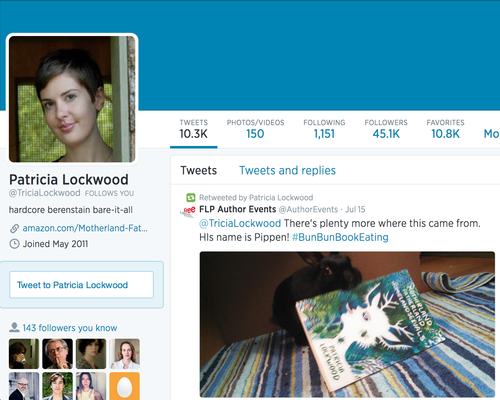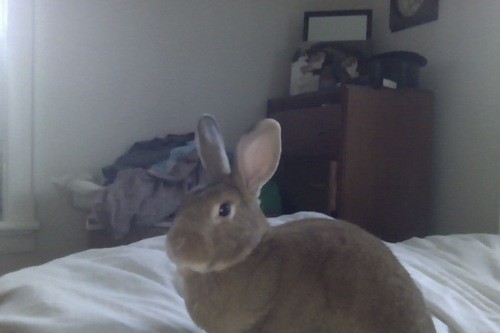
Welcome to the seventh week of What Would Twitter Do? In this series, I interview some of my favourite people on Twitter about their Twitter habits and philosophies. This week features Patricia Lockwood. Her poetry has appeared in many places, including The New Yorker, and Poetry, and she was recently profiled at length (and rather beautifully) in The New York Times Magazine. Her books include Balloon Pop Outlaw Black, and Motherland Fatherland Homelandsexuals, which appeared this spring. Her memoir is forthcoming.
I experience her feed as a bright yellow light—brilliant and energetic and totally engaged with the comedic and the absurd. Her tweets are always surprising, and have a weird, trilling joy vibrating somewhere deep within them, no matter the tweet’s mood or subject. They are often sexual and edged with feminism—
*gets down on my knees to suck a dick of knowledge*
and
To the villain who tried to trick me into watching the world cup by telling me it was happening between my legs: thanks, i loved the game
—and they sometimes tell of the act of writing or the act of tweeting itself, as in—
Most of my tweets should be read in the voice of a 90s youth minister who is getting some pop-culture detail very slightly wrong
One of my recent favourite is this one:
In the 1990s every single song was about a girl who gave herself an abortion by walking unsteadily on a roof.
I was excited to have the chance to interview her by email.
—Sheila Heti
SHEILA HETI: Can you tell me about the pleasure you get from pictures of bunnies eating your book? You have retweeted at least four of these so far.
PATRICIA LOCKWOOD: The story about once going to a petting zoo and seeing a bunny who was almost certainly the reincarnation of Walt Whitman is true. I was walking around the bunny enclosure, not expecting anything supernatural at all, when I saw him meditating outside of his hutch. His beard FLOWED over his breasts. So when the first woman tweeted the picture of her bunbun nibbling my cover, which is indeed leafy, the memory came back to me and I knew I had better put out a call for more.
Here’s what I think: the best author photo ever taken is the author photo of you holding your extra-large engulfing rabbit and looking straight at the camera. I never hope to have one so good. The only way I guess it could be any more literary is if the rabbit were smoking a Gauloise and drinking a tiny cup of coffee.
SH: Thanks! She doesn’t smoke yet, of course. She’s only three. What sorts of tweets about you or your writing do you tend to feel good retweeting, and what do you feel better leaving alone?
PL: When a person puts some creative effort into talking about the book or photographing the book or pretending that their pet is eating it, then I like to retweet it, because it’s more about them than about me. Also I’m happy to retweet tweets that show the cover in a different context or a creative light, because then it’s more about the artist who painted it—Lisa Hanawalt, whom I love. If it’s just a compliment, though, I usually thank the person one-on-one, otherwise you’re just blasting the confetti of your own party at people.
SH: If people tweet at you, do you feel any obligation to reply to them? Do you feel guilty when you don’t? What do you understand your responsibilities to those who tweet at you to be?
PL: I feel an obligation to respond to my friends, but that is a sweet obligation. I feel obliged to respond to people who tell me they’ve been touched by a particular poem. Apart from that, the only thing that dictates whether I respond to someone is whether I have something interesting to say in return. I respond to people I don’t know at all, when their tweet hauls a nice fresh bucket of water up out of me, but if it comes up empty then I just stay quiet.
SH: Do you remember what prompted you to join Twitter in May of 2011?
PL: I got my first smartphone! It was my actual first. Before that I only had real Edison-type phones, and cans that you shouted into, and conchs that you blew to communicate with someone on the other side of the island. Jason asked me if I wanted him to set up Twitter on the phone, and I was like, “Oh, sure … give it ALL the apps, and emojis, and internet websites.” I didn’t really know what Twitter was — I was wallowing in a sty of technological backwardness. But soon I would put my barnyard noises online.
SH: There must have been a point where you started thinking in terms of tweets.Can you talk about how the tweets that emerge in your mind share space with the parts of your mind that write poems? Do they overlap and inspire each other, are they solid little silos across the brain from each other?
PL: Silos is a good metaphor—drown in the grain, young men! It’s easier for me because I operate in dual registers—Poetry Voice and Comedy Voice. Comedy Voice, for the most part, goes on the internet. Poetry Voice goes in poems. I did start having a bit of vertigo when I began work on my current book, which integrates both voices. Now I occasionally have a thought like, “Should I tweet that or save it for the book?” but when that pops into my mind I spank my own hand.
SH: You spank your own hand and DON’T tweet it? (As I write this my bunny has come onto the bed and is sniffing at my computer. I have no idea what her question is.)

PL: She is sniffing for the caret key.
SH: Yes!!!
PL: I spank the hand and then I DO tweet it, and put it in the book too if I want! There’s no law against a sentence existing in two places at once, unlike humans, who are no longer allowed to bilocate because it confuses the cops too much. I love the bunny WITH ALL MY HEART, there is such dignity in the uprightness of her ears.
SH: Thank you for saying that! She is a soup bun, not a pet bun. That’s why her ears. Does twitter work as a salve for your loneliness to any degree? I’m assuming you experience loneliness.
PL: I don’t experience much loneliness, oddly. Sometimes I have thought I was lonely and it turned out I was in reality wanting a snack, just like sometimes I have thought I was mad and it turned out I was actually wearing too many sweaters. I’ve always been very content in the company of my own thoughts, and I prefer to spend much of my time alone. But I do like conversation — for the exercise, for the spark, for the let’s-see-where-it-takes-us, for being able to dip into communal creativity when you’re tired of your own air.
SH: Sorry, I shouldn’t have assumed loneliness. I mostly feel lonely when exercising, which is why I can’t bring myself to do it much. How often do you delete tweets after you’ve tweeted them? Which do you delete?
PL: I delete tweets if I feel that I didn’t get something right about them and it nags at me. Sometimes I delete them if it becomes obvious that they belong in a more concrete project, or if I glance at my page and see that they look ugly in the stream of things. Once I deleted a tweet about the crucifixion of a leprechaun on a shamrock because I thought it might be offensive to the Irish, even though I AM Irish.
SH: Do you save up tweets and look at them later and then tweet them, do you work on and polish and perfect your tweets, or does one just come into your mind, you type it out, and then tweet it?
PL: First tweet, best tweet, I always think. I try not to work them too much or else they get Pie Dough Disease, which is where the dough has been to too much college and doesn’t understand that it is dough anymore and refuses to be shaped. Pie Dough Disease! Poems get that too.
SH: Besides suffering Pie Dough Disease, what do you think makes people bad on twitter?
PL: When they don’t understand the customs, courtesies, and small conventions of the region. When they’re simply there to fight. When they’re indiscriminately spraying the jizz of their cyberbodies at any female avatar they encounter. Most of all, when they are corporations. However, it should be noted that Twitter has a strange transformative power where the absolute worst dunghills of bad tweets, like Chuck Grassley (@ChuckGrassley) and Nancy Grace (@NancyGraceHLN), are touched by a kind of alchemy and start to send out a gold glow of literary light.
SH: Who do you like to follow?
PL: I like to follow funny people almost exclusively—people who are writing little stories, people who are operating in character, people who are narrating odd, impossible stories. People who post tweets that are written as opposed to just exhaled or mindlessly typed. People who post tweets that seem right on the edge of becoming self-aware.
SH: What would you like to see more of on twitter?
PL: More “Bawitdaba” parodies, eternally.
SH: Is the “you” tweeting a “character” to any degree?
PL: My character is a sort of surreal, postmodern Mae West: delusions of grandeur, willingness to say anything, breasts everywhere, even where they don’t belong, and made out of one-liners. I like it when women assume voices of total and even reckless comic authority. I like shocking declarations, and swinging from the chandelier, and general word-drunkenness, and the tight constraints of spangled dresses.
SH: In the world of your tweeting, is there a landscape? Somehow your feed seems to take place in some parallel world to ours, where the literal landscape is a bit different and so are the mutual understandings between us.
PL: Tweets do take place in an Oz, or a Wonderland, or a fricking Narnia. There’s a different language, there are different monuments and main arteries and deep dark woods, scenes are commonplace there that would be unimaginable elsewhere. Time passes differently, and unusual logic is at work. There’s even a witch, and it’s Donald Trump.
SH: Do you think, “I’m going to think of a tweet now” and then you think of one?
PL: No, I tweet when the tweet arrives. Never force a tweet or you will hurt your babymaker—and this is true of literature as well.
Week 1: Kimmy Walters
Week 2: Kate Zambreno
Week 3: Teju Cole
Week 4: Mira Gonzales
Week 5: Tao Lin
Week 6: Christian Lorentzen
Week 8: Crylenol/Sadvil
Week 9: Various
Week 9 ½: Melville House
Week 9 ¾: Roxane Gay
Week 10: Kenneth Goldsmith




